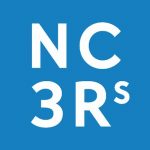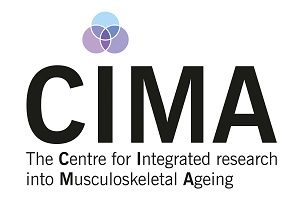The NC3Rs have kindly funded our PhD project that combines the expertise of two supervisors (a cartilage biologist and a tissue engineer) to develop a zonally stratified mechanically responsive tissue engineered model of young and old human articular cartilage using human primary chondrocytes cultured in different hydrogels and/or bioprinting and use it to generate a transcriptomic profile of healthy cartilage ageing.
Grant awarded: 2021-2025 Investigating biomechanical responses in healthy and diseased ageing cartilage – a tissue engineering approach (lead PI: Dr Katarzyna Pirog, co-I: Dr Ana Ferreira Duarte)
Main achievements:
- Farcasanu M*, de las Heras Ruiz T*, Johnson de Sousa Brito FM, Soul J, Coxhead J, German M, Young DA, Ferreira-Duarte A, Pirog KA. Dynamic compression improves chondrogenesis in the tissue engineered model of cartilage. Biotechnology and Bioengineering 2025; 1-18.
- Farcasanu MV, de las Heras Ruiz T, Pirog KA. Dynamic mechanical compression improves the chondrogenic potential of ATDC5 and primary human chondrocytes in agar hydrogels. Int J Exp Path. 2024;105:A1–A23.
- de las Heras Ruiz T, Johnson de Sousa Brito FM, Farcasanu M, Howe S, Young D, Pirog KA. Dynamic compression dramatically improves the chondrogenic potential of ATDC5 cells in the tissue engineered model of healthy and PSACH cartilage. Int J Exp Path. 2022;103:A1–A14.

We were part of the collaborative MRC project grant awarded to the Newcastle and Liverpool Universities to investigate the impact of mechanical trauma on the progression of two age-related skeletal complications (osteoarthritis and osteochondritis dissecans) in genetically engineered mouse models of skeletal dysplasia.
Grant awarded: 2022-2025 Defining the role of aggrecan and type IX collagen in osteoarthritis and osteochondritis dissecans through in vivo studies of genetic bone diseases (lead PI: Prof Michael Briggs, co-I: Dr Katarzyna Pirog, Prof David Young, Dr Matthew German, Dr Blandine Poulet, named PDRA: Dr Ella Dennis)

The JGW Patterson Foundation have kindly sponsored our study to further refine the modulation of an osteoarthritis susceptibility locus as potential therapy for OA and generate preclinical data leading to novel therapy for osteoarthritis.
Grant awarded:
- 2023-2026 Faxitron MultiFocus diagnostic Xray machine for Xray for analysis of calcified tissues in animal models of human disease (lead PI: Dr K Pirog, co-Is: Prof D Young, Prof M Briggs)
- 2024-2025 Potential therapy for osteoarthritis (lead PI: Dr Katarzyna Pirog)
- 2019-2023 PhD studentship in Ageing and Arthritis – Investigating the role of asporin in musculoskeletal ageing (lead PI: Dr K Pirog, co-I: Prof David Young)
Main achievements:
- Johnson de Sousa Brito FM, Pearson RD, Kalamajski S, Young DA, Pirog KA. Role of Asporin in chondroprotection. Int J Exp Path 2024;105:A1–A23
- E. P. Dennis; F. M. Johnson de Sousa Brito; R. D. Pearson; R. M. Jackson; J. Logan; M. Capulli; A. Teti; J. H. Duncan Bassett; G. R. Williams; S. Kalamajski; K. A. Pirog. Asporin is important in bone development but not in cartilage homeostasis. Int J Exp Path. 2021;102:A1–A17.

In 2024 we were part of the The Innovate UK – Accelerated Knowledge Transfer (AKT) scheme in collaboration with 3D Bio-Tissues Limited, and shared our tissue engineering skills, and in particular our expertise of collagen hydrogels and of compressive testing, to develop and validate new models for testing of ocular toxicity.
Grant awarded: 2024 AKTP – 3D Bio-Tissues (lead PI: Dr Katarzyna Pirog, co-I Dr Ricardo Gouveia)

We are researching the molecular mechanisms triggered by the hemiepiphysiodesis, a corrective surgery approach used in guided growth, which is quite commonly applied in skeletal dysplasia patients. In this project, kindly funded by the Newcastle Hospitals Charity Trust, and driven by our Clinical PhD student and Paediatric Orthopaedic Surgical Trainee Anna Porter, we used our tissue engineered model of cartilage and human primary cells collected during the corrective surgical procedures performed at Newcastle upon Tyne hospitals to study the mechanism of hemiepiphysiodesis and the subsequent rebound growth.
Grant awarded: 2023-2024 Healthy and dysplastic chondrocyte (lead PI: Dr Katarzyna Pirog, co-I Dr Kenneth Rankin)
Main achievements:
- Ethical approval for collection of discarded tissues from guided growth surgical interventions

We have been researching proteins that are involved in the modulation of osteoarthritis (OA), and using mouse genetics to generate conditional and inducible gene knock-out models. Dunhill Medical Trust have kindly funded our 4 year project that allowed us to investigate the role of a small extracellular matrix protein asporin in age and surgically induced osteoarthritis as a proof of concept for future OA therapy, and to create a comprehensive transcriptomic profile of the challenged cartilage and meniscus tissue that will help us discover more disease relevant therapeutic targets. moreover, the project involved a successful collaboration with a patient group and resulted in a new collaboration with Prof Del’Accio’s group at the Queen Mary University of London.
Grant awarded:
- 2020-2024 Investigating the role of a small leucine rich protein asporin in cartilage ageing and disease (lead PI: Dr K Pirog, co-I: Prof David Young)
Main achievements:
- Johnson de Sousa Brito FM, Pearson RD, Kalamajski S, Young DA, Pirog KA. Role of Asporin in chondroprotection. Int J Exp Path 2024;105:A1–A23
- E. P. Dennis; F. M. Johnson de Sousa Brito; R. D. Pearson; R. M. Jackson; J. Logan; M. Capulli; A. Teti; J. H. Duncan Bassett; G. R. Williams; S. Kalamajski; K. A. Pirog. Asporin is important in bone development but not in cartilage homeostasis. Int J Exp Path. 2021;102:A1–A17.

We are constructing a zonally stratified model of cartilage, which we will use as a tool to investigate cartilage differentiation and cell-matrix interactions in ageing and in rare skeletal conditions. Developing this exciting model would not be possible without the generous support of the JGW Patterson Foundation.
Grants awarded:
- 2015-2019 Peter May PhD studentship – Biomechanical sensing in cartilage ageing and disease (lead PI: Dr K Pirog, co-I: Prof D Young)
- 2013-2016 Flexcell compression system for biomechanically stimulated in vitro cartilage constructs in the investigation of osteoarthritis (lead PI: Dr K Pirog, co-Is: Prof D Rowan, Prof M Birch, Prof D Young)
Main achievements:
- Farcasanu M*, de las Heras Ruiz T*, Johnson de Sousa Brito FM, Soul J, Coxhead J, German M, Young DA, Ferreira-Duarte A, Pirog KA. Dynamic compression improves chondrogenesis in the tissue engineered model of cartilage. Biotechnology and Bioengineering 2025; 1-18.
- de-las-Heras-Ruiz T, Pirog KA. Tissue Engineering Approaches for the Study and Therapeutic Intervention in Osteoarthritis. In: Osteoarthritis. SM Group Open Access eBooks, 2016.
- de las Heras Ruiz T, de Sousa Brito F, Farcasanu M, Howe S, Young D, Pirog KA.
Dynamic compression dramatically improves the chondrogenic potential of ATDC5 cells in the tissue engineered model of healthy and PSACH cartilage. Int J Exp Path. 2022;103:A1–A14.
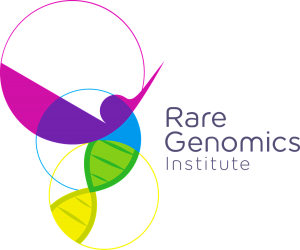
The BeHEARD (Helping Empower and Accelerate Research Discoveries) Challenge is hosted annually by the Rare Genomics Institute and is open globally to researchers, foundations, or anyone whose research is constrained due to limited resources. It provides technology and financial grants for rare disease research.
Grant awarded: in the 2017-2018 edition, we won the bid for a technology prize from Cyagen, for a conditional knock-out vector to generate a mouse model to study a skeletal dysplasia (lead PI: Dr K Pirog)
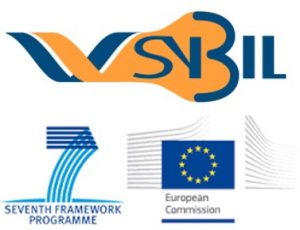
The EU-FP7 SYBIL (Systems biology for the investigation of rare and common skeletal conditions) project was a highly collaborative project between 18 centres across Europe. In our laboratory this project funded the study of several ECM proteins and investigation of several components of the ER stress pathway in cartilage development and disease.
Grant awarded: 2013-2018 SYBIL (lead PI: Prof M Briggs, Newcastle co-I: Dr K Pirog (also as work package leader (WP9))
Main achievements:
- Dennis EP, Edwards S, Jackson RM, Capulli M, Teti A, Ishiguro K, Pirog KA, Briggs MD.CRELD2 is a novel LRP1 chaperone that regulates non-canonical WNT signalling in skeletal development. JBMR 2020, doi: 10.1002/jbmr.4010.
- Pirog KA, Dennis EP, Hartley CL, Jackson RM, Soul J, Schwartz JM, Bateman JF, Boot-Handford RP, Briggs MD. XBP1 signalling is essential for alleviating mutant protein aggregation in ER-stress related skeletal disease. PLoS Genetics 2019;15(7):e1008215. doi: 10.1371/journal.pgen.1008215.
- Bell PA, Dennis EP, Hartley CL, Jackson RM, Porter A, Boot-Handford RP, Pirog KA, Briggs MD. Mesencephalic astrocyte-derived neurotropic factor is an important factor in chondrocyte ER homeostasis. Cell Stress Chaperones. 2019;24(1):159-173
- Paganini C, Monti L, Costantini R, Besio R, Lecci S, Biggiogera M, Tian K, Schwartz JM, Huber C, Cormier-Daire V, Gibson BG, Pirog KA, Forlino A, Rossi A. Calcium activated nucleotidase 1 (CANT1) is critical for glycosaminoglycan biosynthesis in cartilage and endochondral ossification. Matrix Biol. 2018; pii: S0945-053X(18)30397-4.
- Cameron TL, Gresshoff IL, Bell KM, Piróg KA, Sampurno L, Hartley CL, Sanford EM, Wilson R, Ermann J, Boot-Handford RP, Glimcher LH, Briggs MD, Bateman JF.Cartilage-specific ablation of XBP1 signaling in mouse results in a chondrodysplasia characterized by reduced chondrocyte proliferation and delayed cartilage maturation and mineralization. Osteoarthritis Cartilage. 2015;23(4):661-70
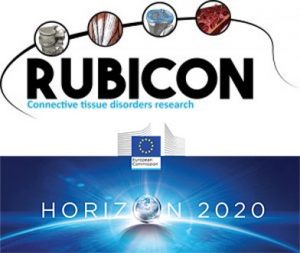
RUBICON was an EU-funded Research and Innovation Staff Exchange network supported by the Horizon 2020 programme. The project focused on common and rare connective tissue disorders, and funded a series of staff exchange programs, with the aim of sharing knowledge and technical skills among the 10 international (5 European and 5 overseas) academic partners.
Grant awarded: 2016-2019 RUBICON (lead PI: Prof Michael Briggs, Newcastle co-I: Dr K Pirog as (also as an exchange fellow, investigating oxidative stress pathway in chondrodysplasia)
Main achievements:
- characterisation of the oxidative stress signature in cell models of pseudoachondroplasia (PSACH)
- generation of a fluorescent ER-localised oxidative stress probe for real time read-outs of stress responses and high-throughput drug screening

The JGW Foundation have kindly funded the generation of a knock-out transgenic mouse model to study the role of long non-coding RNA (lncRNA) in osteoarthritis progression through a collaborative project between Prof David Young in Newcastle and our group.
Grant awarded: 2015-2017 The role of long non-coding RNAs in regulating chondro-genesis and osteoarthritis: A transgenic approach (lead PI: Prof David Young, co-I: Dr K Pirog)
Main achievements:
- Woods S, Charlton S, Cheung K, Hao Y, Soul J, Reynard LN, Crowe N, Swingler TE, Skelton AJ, Piróg KA, Miles CG, Tsompani D, Jackson RM, Dalmay T, Clark IM, Barter MJ, Young DA. microRNA-seq of cartilage reveals an over-abundance of miR-140-3p which contains functional isomiRs. RNA 2020, 26, 1575-1588R
Collaborations and networks:
In 2020 and 2021 we hosted a CIMA MRes projects looking at mechanosensing in healthy cartilage ageing in a tissue engineered model, in collaboration with Newcastle University School of Engineering. We were also involved in a pump prime CIMA grant awarded to Dr Elizabeth Laird at the University of Liverpool, which funded novel equipment to image tendon microtears and mechanically test murine tissues and tissue engineered tendon constructs.
Main achievements:
- refining the 3D tissue culture system for culture of musculoskeletal cells
- development of a novel tendon testing and imaging system
MCDS-Therapy is a scientist-led international collaboration of 11 organisations, funded by the European Union to deliver the clinical trial. We are working closely with patients to deliver the treatment and hope to help develop the global community of MCDS patients through our work. Ultimately, we plan to pioneer an academic drug repurposing pathway, capable of delivering a transformative treatment for a rare patient population from bench to bedside, independent of the pharmaceutical industry.
Grant awarded: 2018-2023 MCDS-Therapy (lead PI: Prof Michael Briggs, co-I: Dr K Pirog)
Main achievements:
- generation of a luciferase-based assay for detection of UPR levels in high-throughput drug screening
- Briggs MD, Dennis EP, Dietmar H, Pirog KA. New developments in chondrocyte ER-stress and related diseases. F1000Research 2020, 9 (F1000 Faculty Rev):290
